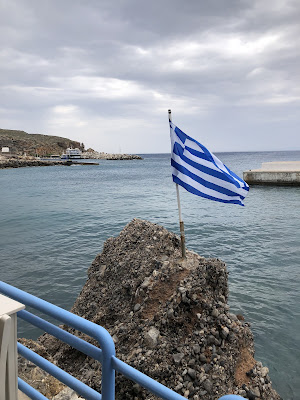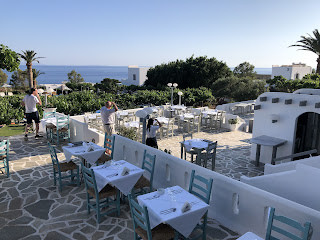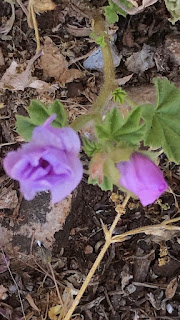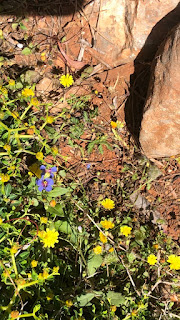We are all packed and ready to leave. Well, that’s not exactly true. We are prepared to leave. Our tidy camp comfort has been returned to its hotel room standards; all our belongings are in the car; the final bill has been paid; and various staff members who offered us special kindnesses have been thanked. Yes, we’re ready to go, but we would really like to stay a little longer.
Following my last installment, we really settled down to enjoy the resort and the little town of Sfakia. Wow! The town has experienced some intensive gentrification in the last seven years, but some things haven’t changed at all: Sfakian lamb and potatoes, towels drying on Ilian’s balcony, the Greek flag and Cretan hospitality.
We were impressed by how many of the people we remembered and how many remembered us. Then we read that there are fewer than 300 people in the town. No wonder it was easy to remember them. Why they remembered us is anyone’s guess, but they did. One gentleman remembered we had been to Croatia, what wine we liked, where we stayed in the town before we found Vritomartis, and even some of the questions we had asked. Amazing!
A trip to the Filaki Beach was a must. We went on a stormy day, perfect for sitting up top and watching the angry surf. Not only was the scenery instagram worthy, the octopus salad was outstanding.
 |
Some nice walks and another ride or two in the country scouting for wildflowers rounded out the time, but I didn’t spot anything new. We have decided that to see more, we would have to do a walk in one of the gorges (it’s going to take some conditioning before I sign up for that) or spend more time on the north side of the island (that will have to wait for the next trip). No new flowers, but the scenery was breathtaking.
The highlight of every day is dressing for dinner on the terrace. We score high marks for lingering over dinner, sometimes visiting with other guests, sometimes quietly waiting to spot the moon and Venus.
However, on our last night, we broke with tradition and took a boat ride to Loutro for dinner. Exciting ride, great meal, a delightful couple to share the evening, McClure and Reid from Tennessee, and a great way to wrap up our visit.
We have met some wonderful Brits that I hope to stay in touch with. Andy and Cathy from Bristol and John and Sue from Nottingham. All four of them are delightful. We had a grand time with them over a long dinner with as many stories as calories and shared a couple evenings with them in the lounge.
Speaking of evenings in the lounge, Stanley’s favorite was the Cretan Dancers. What energy! Super! For me, it was the Blues Guy because we got to show off our waltzing prowess - twice. Some of the karaoke was painful, but one woman brought the house down with her rendition of Édith Piaf’s “Non, je ne regrette rien.” Sung perfectly! I’ll remember her long after I’ve forgotten the painful effort of “Dancing Queen.”
The staff at the hotel have been remarkably pleasant and helpful. I can’t remember ever being around a group of people so intent on making the lives of others as comfortable and easy as possible. And they do it with such grace. It is so remarkable that Stanley and I did some research. It seems the people of Crete take hospitality very seriously and even consider it a matter of morality. The staff of this resort simply take it to a very high level.
There’s something else I like about this resort. They are very interested in the environment and it’s more action than just thoughts and prayers. Everything is served on or in glass or porcelain. There are no paper plates, plastic water bottles, or styrofoam anything. The toilet paper and trash bags are bamboo. Maids use cloths - no paper towels. No straws in anything. Rooftops are covered in solar panels. The place is kept immaculately clean inside and out. All the glass bottles are recycled by a company in Chania. I asked the owner of the resort about all of this. He told me it was his personal commitment to make the resort as sustainable as possible. He doesn’t know what happens to the glass once it leaves the resort, but his only concern at this time is that it doesn’t end in a land fill. As he said, “We have to start somewhere.”
Now, a dash of bleaker reality. We have had wind. Strong wind. It has come from the north, up over the mountains and down to the ocean in great gusts. It doesn’t last long, but when it comes, it makes being outside unpleasant. It hasn’t bothered us very much because we’ve had plenty of reading and writing to entertain us, but for those who came for the whole resort experience, it’s been a downer. But, like my rain soaked suitcases when we landed in Italy, you can’t count anything the weather department dishes out as a disappointment. For the most part, the weather has been wonderful, but perhaps a little cooler than we had expected.
And now you know how we managed to spend two weeks on the south side of Crete. We leave Sfakia with happy memories and a clear intention of returning - as often and as soon as possible. Perhaps one day we will be able to say the same thing a gentleman told me yesterday, “I’ve been coming here for years. I’m family now.”




















































































